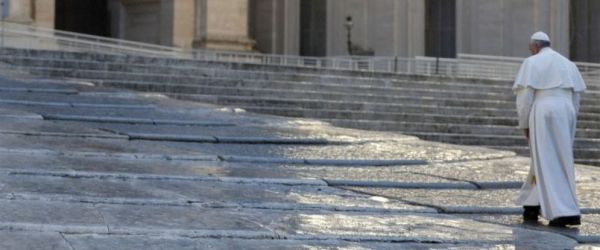Today’s Gospel passage (cf. Lk 12:13-21) begins with the narrative of a man who stands up among the multitude and asks Jesus to settle a legal matter concerning a family inheritance. However, Jesus does not address the matter in his reply, but rather urges the people to eschew covetousness, that is, the greed of possession. In order to divert his listeners from this exhausting search for wealth, Jesus tells the parable of the foolish rich man who believes he is happy because he has had the good fortune to reap an exceptional harvest and he feels secure thanks to the goods he has accumulated. It would do you good to read it today; it is in the 12th Chapter of Saint Luke, verse 13. It is a beautiful parable that teaches us a great deal. The narrative comes to the fore in the contrast between what the rich man plans for himself and what God plans for him instead.
The rich man puts three considerations before his soul, that is, himself: the accumulated goods, the many years that these goods appear to ensure him, and thirdly tranquility and unrestrained enjoyment (cf v. 19). But the word that God addresses to him nullifies his plans. Instead of “many years”, God points to the immediacy of “this night; tonight you will die”. Instead of the “enjoyment of life”, He presents him with “surrendering his life; you will render your life to God” with the ensuing judgment. Regarding the reality of the ample goods accumulated on which the rich man had based everything, it becomes shrouded in sarcasm by the question: “and the things you have prepared, whose will they be?” (v. 20). Let us think about quarrels over inheritance, many family quarrels. And how many people; we all know some stories about many people, who turn up at the time of death: nephews, grandchildren come around to see: “what is my share?”, and they cart everything away. It is within this contrast that the term “fool” — because he thinks about things that he believes to be concrete but that are fantasy — with which God addresses this man, is justified. He is foolish because in practice he has denied God, he has not taken Him into account.
The end of the parable as recounted by the Evangelist is uniquely effective: “So is he who lays up treasure for himself, and is not rich toward God” (v. 21). It is a warning which reveals the horizon towards which we are called to look. Material goods are necessary — they are goods! —, but they are a means to live honestly and in sharing with the neediest. Today, Jesus invites us to consider that wealth can enslave the heart and distract it from the true treasure which is in heaven. Saint Paul also reminds us of this in today’s second reading. It says “seek the things that are above.... Set your minds on things that are above, not on things that are on earth” (Col 3:1-2).
It is understood that this does not mean estranging oneself from reality, but rather seeking the things that have true value: justice, solidarity, welcome, fraternity, peace, all things that make up the true dignity of mankind. It is a case of leading a life that is fulfilled not according to a worldly manner, but rather according to the style of the Gospel: to love God with all one’s being, and love one’s neighbour as Jesus loved him, that is, in service and in giving oneself. Covetousness of goods, the desire to have goods, does not satisfy the heart, but rather causes more hunger! Covetousness is like those tasty candies: you take one and say: “Ah! It is so good”, and then you take another; and one follows the other. Such is covetousness: it never satisfies. Be careful! Love that is understood and lived in [the style of the Gospel] is the source of true happiness, whereas the exaggerated search for material goods and wealth is often a source of anxiety, adversity, abuse of power, war. Many wars begin from covetousness.
May the Virgin Mary help us not to be attracted by forms of security that fade, but rather to be credible witnesses of the eternal values of the Gospel, each day.
[Pope Francis, Angelus 4 August 2019]












